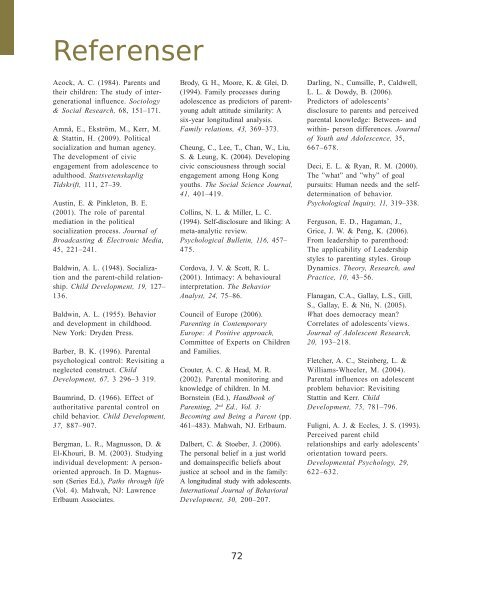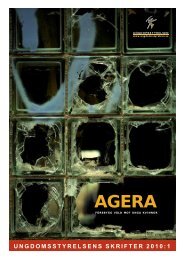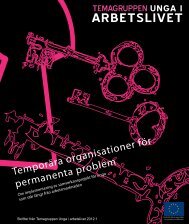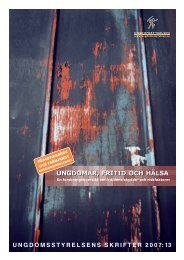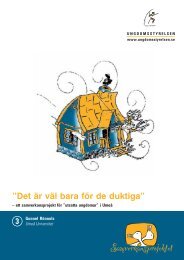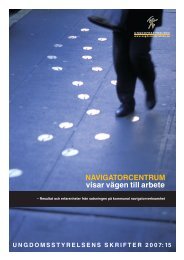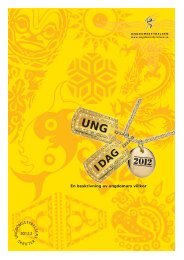- Page 5:
FörordUngdomsstyrelsen har fått r
- Page 9 and 10:
Kapitel 1Ungdomsinflytandei ett his
- Page 13 and 14:
Kapitel 16Statliga insatserHur arbe
- Page 15:
Ungas inflytandeoch representationU
- Page 19 and 20:
Exempel på en hårdare och mer dir
- Page 21 and 22:
där är de individuella resurserna
- Page 23 and 24: idrar en pressad ekonomisk situatio
- Page 25 and 26: ordinarie utbildnings- och försör
- Page 27 and 28: Noter1Inom området ungas inflytand
- Page 29 and 30: Ungdomsinflytande i etthistoriskt p
- Page 31 and 32: Det var dock inte helt ungdomsdrivn
- Page 33 and 34: tänkandet som frågan om ungas del
- Page 35 and 36: dan kan utföra, inte att unga är
- Page 37 and 38: i vardagen i de verksamheter de bes
- Page 39 and 40: SOU 1945:22. Ungdomen ochnöjeslive
- Page 41 and 42: Lagar och riktlinjerI Sverige finns
- Page 43 and 44: • unga skulle ha goda förutsätt
- Page 45 and 46: Inflytande på fritidenUngas rätt
- Page 47 and 48: I läroplanen för det obligatorisk
- Page 49 and 50: och omfattar alla svenska medborgar
- Page 51 and 52: ReferenserEuroparådet (2008a). The
- Page 54 and 55: KAPITEL 352
- Page 56 and 57: FamiljedemokratiBarns och ungas inf
- Page 58 and 59: Ser unga sina familjersom demokrati
- Page 60 and 61: Syskonens betydelseför familjedemo
- Page 62 and 63: Men som tidigare understrukits är
- Page 64 and 65: anpassning hos barn och unga (se Cr
- Page 66 and 67: Familjedemokratioch ungassamhällse
- Page 68 and 69: Tabell 3.2 Effekter av kön, socioe
- Page 70 and 71: ver ungas inflytande (tabell 3.3, s
- Page 72 and 73: tur har betydelse för ungas anpass
- Page 76 and 77: Persson, S. (2009). Adolescents’r
- Page 78 and 79: KAPITEL 476
- Page 80 and 81: Idag är dock satsningen avslutad o
- Page 82 and 83: ”Gårdsdemokrati kräver kvalific
- Page 84 and 85: ett alltför förenklat perspektiv
- Page 86 and 87: Vad hände medde goda exemplen?Ett
- Page 88 and 89: anställs för att vara en länk me
- Page 90 and 91: den splittrade bild som ges vid kon
- Page 92 and 93: 10080TjejerKillar6040200Vilka aktiv
- Page 94 and 95: etet som en process borde ett väl
- Page 96 and 97: ReferenserAndersson, J., Agdur, J.,
- Page 98 and 99: KAPITEL 596
- Page 100 and 101: Granskar man föreningsdeltagandet
- Page 102 and 103: Andelen som anger att de aktivt har
- Page 104 and 105: Tabell 5.5 Medlemskap i föreningar
- Page 106 and 107: Tabell 5.6 Upplevt inflytande i fö
- Page 108 and 109: Den andra aspekten av delaktighet s
- Page 110 and 111: fram till början av 2000-talet var
- Page 112 and 113: Tabell 5.9. Planer och strategier f
- Page 114 and 115: Avslutande diskussionDet finns intr
- Page 116 and 117: Bilaga 5.1Kommentar till tabell 5.2
- Page 118 and 119: ReferenserHarding, T. (2009). Kan m
- Page 120 and 121: KAPITEL 6118
- Page 122 and 123: Vilka effekter elevinflytande har p
- Page 124 and 125:
Tabell 6.1 Hur stort inflytande tyc
- Page 126 and 127:
I klassrummetSkolverket genomför v
- Page 128 and 129:
medan elevråd i högre grad är en
- Page 130 and 131:
om vad saken gällde kodades i efte
- Page 132 and 133:
Vad ska eleverha inflytande över?U
- Page 134 and 135:
Tabell 6.5 Skolinspektionens tillsy
- Page 136 and 137:
Tabell 6.6 Skolinspektionens tillsy
- Page 138 and 139:
skollagen om demokratiska kunskaper
- Page 140 and 141:
En lärarutbildningi förändringI
- Page 142 and 143:
Avslutande reflektionDet grundlägg
- Page 144 and 145:
”Det beror väl lite på vilken n
- Page 146 and 147:
Bilaga 6.1Tematisk intervjuguideMå
- Page 148 and 149:
ReferenserBorg Wallin, K. (2010). C
- Page 150 and 151:
KAPITEL 7148
- Page 152 and 153:
de fackliga organisationerna diskut
- Page 154 and 155:
Tabell 7.1 Fackligt medlemskap och
- Page 156 and 157:
100908015-19 år fast anställda 15
- Page 158 and 159:
sökt vad som organisatoriskt kan g
- Page 160 and 161:
Tabell 7.4 Ungas arbetssituation. V
- Page 162 and 163:
För att tydligt kunna urskilja den
- Page 164 and 165:
Tabell 7.5 Sammanfattande tabell. A
- Page 166 and 167:
männen men inte bland de unga kvin
- Page 168 and 169:
har ingen signifikant effekt bland
- Page 170 and 171:
Bilaga 7.1RegressionsmodellerKommen
- Page 172 and 173:
Tabell 7.7 Arbetsplatsens organisat
- Page 174 and 175:
Kan du delvis själv bestämma när
- Page 176 and 177:
Heltids- eller deltidsarbeteUrsprun
- Page 178 and 179:
Noter1MBL2Enligt SCB:s instruktione
- Page 180 and 181:
KAPITEL 8178
- Page 182 and 183:
samt de allt längre studieperioder
- Page 184 and 185:
Tabell 8.1 Social bakgrund och levn
- Page 186 and 187:
Detta, i kombination med betydande
- Page 188 and 189:
inte bli sedd och lyssnad på som i
- Page 190 and 191:
Att flytta till en ort med bättre
- Page 192 and 193:
UngdomsstyrelsenskommentarAnna Ange
- Page 194 and 195:
unga som ofta oroar sig för sin ek
- Page 196 and 197:
ReferenserAngelin, A. & Salonen, T.
- Page 198 and 199:
KAPITEL 9196
- Page 200 and 201:
Av de unga svarar 63 procent att et
- Page 202 and 203:
Inställning till en stark ledareDr
- Page 204 and 205:
ingen hos unga hade endast massmedi
- Page 206 and 207:
”Jag har fyllt 18 år. Det känns
- Page 208 and 209:
föräldrar svarar i högre grad at
- Page 210 and 211:
”Det finns ju möjligheter för m
- Page 212 and 213:
Möjlighet attpåverka den egnalivs
- Page 214 and 215:
Unga om att påverkaden egna livssi
- Page 216 and 217:
Känsla av delaktighet idet svenska
- Page 218 and 219:
Tabell 9.7 Effekten av social bakgr
- Page 220 and 221:
Avslutande diskussionDetta avsnitt
- Page 222 and 223:
Ungas representationI detta avsnitt
- Page 224 and 225:
Tabell 9.9 Andel som är aktiva i p
- Page 226 and 227:
tiska punkter från att bli nominer
- Page 228 and 229:
Utveckling över tidI det följande
- Page 230 and 231:
Unga i myndighetsstyrelserochkommit
- Page 232 and 233:
Bilaga 9.1Tabell 9.1 Andel som anse
- Page 234 and 235:
Tabell 9.3 Andelar som anser att de
- Page 236 and 237:
Tabell 9.4b Andel som anser sig ha
- Page 238 and 239:
Tabell 9.6 Andel som instämmer hel
- Page 240 and 241:
Bilaga 9.2VariabelbeskrivningUngdom
- Page 242 and 243:
Föräldrars utbildningUtgörs av d
- Page 244 and 245:
ReferenserNoterIntegrations- och j
- Page 246 and 247:
KAPITEL 10244
- Page 248 and 249:
under så många val tillbaka i tid
- Page 250 and 251:
mekanism till generationseffekter.
- Page 252 and 253:
för det mesta men inte alltid vari
- Page 254 and 255:
Unga väljarespolitiska intresseNä
- Page 256 and 257:
Politiskt intresseÅlderKälla: De
- Page 258 and 259:
PartiidentifikationKälla: De svens
- Page 260 and 261:
Likheterna i dessa förändringar b
- Page 262 and 263:
Unga väljares partivalSlutligen sk
- Page 264 and 265:
Socialdemokraterna514957 5752 52554
- Page 266 and 267:
Kristdemokraterna303 1012 2 23 2 23
- Page 268 and 269:
SocialdemokraternaKälla: De svensk
- Page 270 and 271:
KristdemokraternaÅlderKälla: De s
- Page 272 and 273:
Bilaga 10.1Tabell 10.1 Valdeltagand
- Page 274 and 275:
Tabell 9. Fem generationers väljar
- Page 276 and 277:
ReferenserAmnå, E., Ekström, M.,
- Page 278 and 279:
DEL 2Kapitel 11Kapitel 12Var du bor
- Page 280 and 281:
KAPITEL 11278
- Page 282 and 283:
”Ungdomars liv och levnadsvillkor
- Page 284 and 285:
det genomsnittliga och det ideala (
- Page 286 and 287:
”När jag flyttade till Gävle d
- Page 288 and 289:
kans plikt att själv göra ”det
- Page 290 and 291:
att överväga en eventuell flytt.
- Page 292 and 293:
ReferenserCanguilhem, G. (1989). Th
- Page 294 and 295:
KAPITEL 12292
- Page 296 and 297:
glidande skala mellan politisk apat
- Page 298 and 299:
ställer sig också frågan om vilk
- Page 300 and 301:
teori om negativa koncentrationseff
- Page 302 and 303:
förtroende för politiska beslutsf
- Page 304 and 305:
o i ett område präglat av hög ar
- Page 306 and 307:
värde på närmare 80, uttryckt i
- Page 308 and 309:
I denna grupp sjunker i stället ti
- Page 310 and 311:
Bilaga 12.1Frågeformuleringar och
- Page 312 and 313:
ReferenserAdman, P. (2004). Arbetsl
- Page 314 and 315:
Noter1Att studera ungas attityder o
- Page 316 and 317:
DEL 3Kapitel 13Kapitel 14Kapitel 15
- Page 318 and 319:
KAPITEL 13316
- Page 320 and 321:
Vogel, Amnå, Munch & Häll 2003).
- Page 322 and 323:
Sörbom 2002, Ward 2008). Två exem
- Page 324 and 325:
Många unga var också aktiva i den
- Page 326 and 327:
gare sagts om livscykeleffekter. Ga
- Page 328 and 329:
allt yngre medborgare från att del
- Page 330 and 331:
Svenska ungdomar ochpolitisk konsum
- Page 332 and 333:
Tabell 13.1 innehåller allmän inf
- Page 334 and 335:
Tabell 13.2 Andel politiska konsume
- Page 336 and 337:
Den största skillnaden mellan poli
- Page 338 and 339:
Bilaga 13.1Kommentar till tabell 13
- Page 340 and 341:
ReferenserAckelsberg, M. (2003). Br
- Page 342 and 343:
Petersson, O., Westholm, A. &Blombe
- Page 344 and 345:
KAPITEL 14342
- Page 346 and 347:
9-14 år (255 minuter)Cd-skiva 4 %R
- Page 348 and 349:
Sverige och är en av de mer framtr
- Page 350 and 351:
Sociala medier som facebook och twi
- Page 352 and 353:
Det allt mer utbredda bruket av fac
- Page 354 and 355:
ciala nätverk är uppbyggda och hu
- Page 356 and 357:
”Sociala medier kan påverka alla
- Page 358 and 359:
”Det kan komma en fråga som manp
- Page 360 and 361:
ilder och filmer. Det som tradition
- Page 362 and 363:
de sina källor och sina världar e
- Page 364 and 365:
Internets struktur är komplex och
- Page 366 and 367:
ReferenserAmnå, E. (Ed.) (2010). N
- Page 368 and 369:
Noter1I Ungdomsstyrelsens rapport S
- Page 370 and 371:
KAPITEL 15368
- Page 372 and 373:
mella och icke-formella utbildninge
- Page 374 and 375:
Anledningen till att de bor i Sveri
- Page 376 and 377:
Hedda, 27 år, studerar mänskliga
- Page 378 and 379:
sammanhanget. Det blev starten för
- Page 380 and 381:
visor och mitt engagemang bottnar d
- Page 382 and 383:
RekryteringEtt av många teman unde
- Page 384 and 385:
Från att viljatill att göraDe 15
- Page 386 and 387:
Yvonne beskriver sig själv som vä
- Page 388 and 389:
motivera individen att ta steget ti
- Page 390 and 391:
gagemang. Människors engagemangbot
- Page 392 and 393:
etydelse för ungas socialisation.
- Page 394 and 395:
ReferenserAmnå, E. (Ed.) (2010). N
- Page 396 and 397:
DEL 4Kapitel 16Kapitel 17Kapitel 18
- Page 398 and 399:
KAPITEL 16396
- Page 400 and 401:
sedan ska tas hänsyn till dessa å
- Page 402 and 403:
arbete. Detta understryks ytterliga
- Page 404 and 405:
Bidraget kan endast sökas av skolh
- Page 406 and 407:
Försäkringskassan, Handisam, Stat
- Page 408 and 409:
Lagar ochförordningarLag (1993:335
- Page 410 and 411:
KAPITEL 17408
- Page 412 and 413:
ningens metod tillåter varken en k
- Page 414 and 415:
Tabell 17.4 Inflytandeforum indelad
- Page 416 and 417:
Större möten och sammankomster sa
- Page 418 and 419:
Dialogforumens målStörre möten o
- Page 420 and 421:
KAPITEL 18418
- Page 422 and 423:
Några övergripandeslutsatserUnga
- Page 424 and 425:
Politiskt intresse, attityderoch in
- Page 426 and 427:
eslut. Även för ungdomsfullmäkti
- Page 428 and 429:
Motsatsen till att få vara med och
- Page 430 and 431:
Kränkningar, förtryck och bristan
- Page 432 and 433:
Målsättningen med ungas inflytand
- Page 434 and 435:
Skolinspektionen som pågick mellan
- Page 436 and 437:
få stöd och uppmuntran från chef
- Page 438 and 439:
inflytande på fritidsgårdar, samt
- Page 440 and 441:
Ett ökat ansvarstagande ikommunern
- Page 442 and 443:
FörslagUngdomsstyrelsens uppfattni
- Page 444 and 445:
Utbilda lärareoch skoledarei demok
- Page 446 and 447:
Inom EU arbetar man systematiskt me
- Page 448 and 449:
ReferenserElofsson, S. (2007). Infl
- Page 450 and 451:
Rekommendationer till ungdomsminist
- Page 452 and 453:
”Segregationsfrågan är så vikt
- Page 454 and 455:
”Jag skulle lyfta utbildningsfrå
- Page 456 and 457:
”Mitt tips till ungdomsministernj
- Page 458:
FOKUS10En analys av ungas inflytand


